
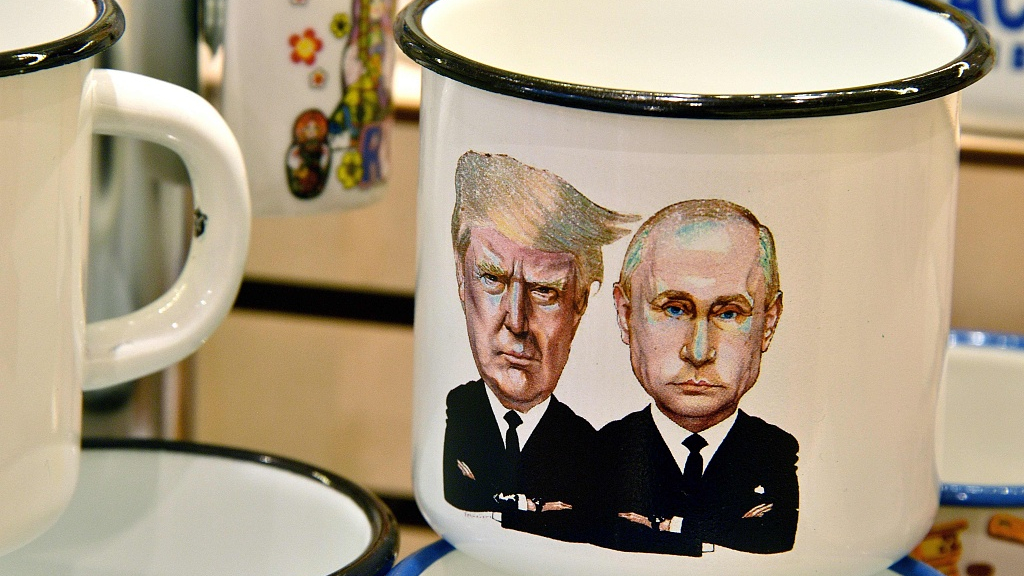
Following the termination of the landmark 1987 Intermediate-Range Nuclear Forces (INF) Treaty, the fate of the 2010 New Strategic Arms Reduction Treaty (New START), the last remaining major nuclear deal between the U.S. and Russia, is increasingly uncertain.
Read more:
The history of U.S.-Russia nuclear arms control deals and what's next
Is arms race 2.0 coming with INF Treaty in danger?
U.S. exodus from multilateral accords
The New Start Treaty, together with the INF, is considered a centerpiece of superpowers arms control. It was signed by former U.S. President Barack Obama and his Russian counterpart Dmitry Medvedev in Prague in 2010 and expires in February 2021 but can be extended for five years if both sides agree.
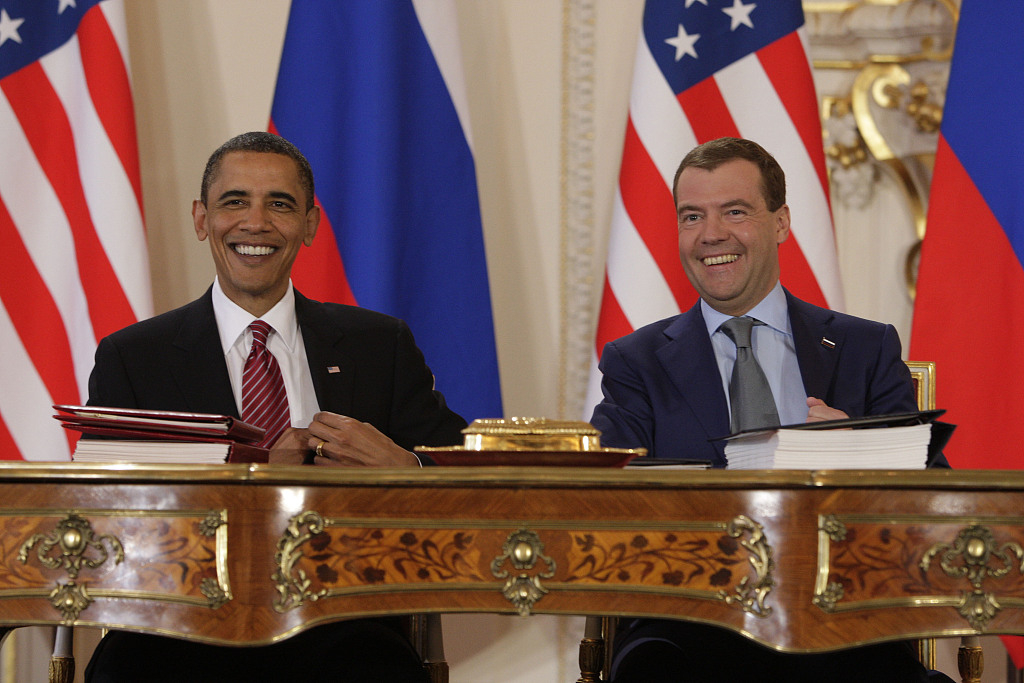
U.S. President Barack Obama (L) and his Russian counterpart Dmitry Medvedev at the signing ceremony of the new strategic arms reduction treaty between the two countries at Prague Castle, Prague, Czech Republic, April 8, 2010. /VCG Photo
The pact calls for deployable nuclear warheads and bombs to be capped at no more than 1,550. It limits deployed intercontinental ballistic missiles, submarine-launched ballistic missiles and nuclear bombers to 700 and non-deployed ICBMs, SLBM and bombers to 800.
Renewal talks stall; New Start fate teeters
While Russia has showed interest in renewing the pact, Trump has previously called it a "bad deal", making the fate of the deal teeter.
"We have already said a hundred times that we are ready for talks, but no one is negotiating with us," said Russian President Vladimir Putin in June.
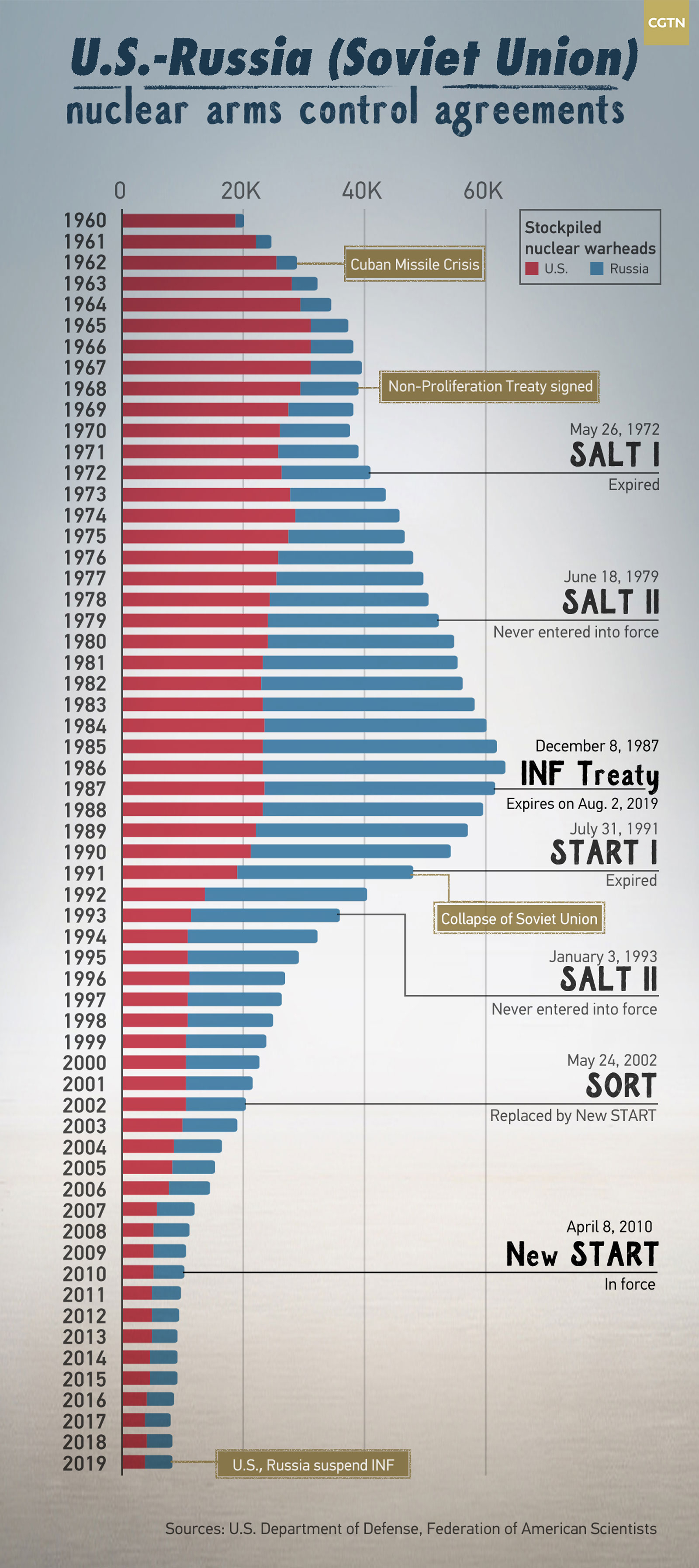
Asked about New START's future, John Bolton, Trump's national security adviser, said on July 31 that the pact was unlikely to be extended, though no final decision had yet been made.
"The New START nuclear agreement, which was ratified in 2010, was flawed from the beginning. It did not cover short-range tactical nuclear weapons or new Russian delivery systems. It is due to expire in February 2021, and while no decision has been made, it is unlikely to be extended. Why extend the flawed system just to say you have a treaty?" said Bolton.
In February 2017, Trump called the agreement "a one-sided deal" and a "bad deal."
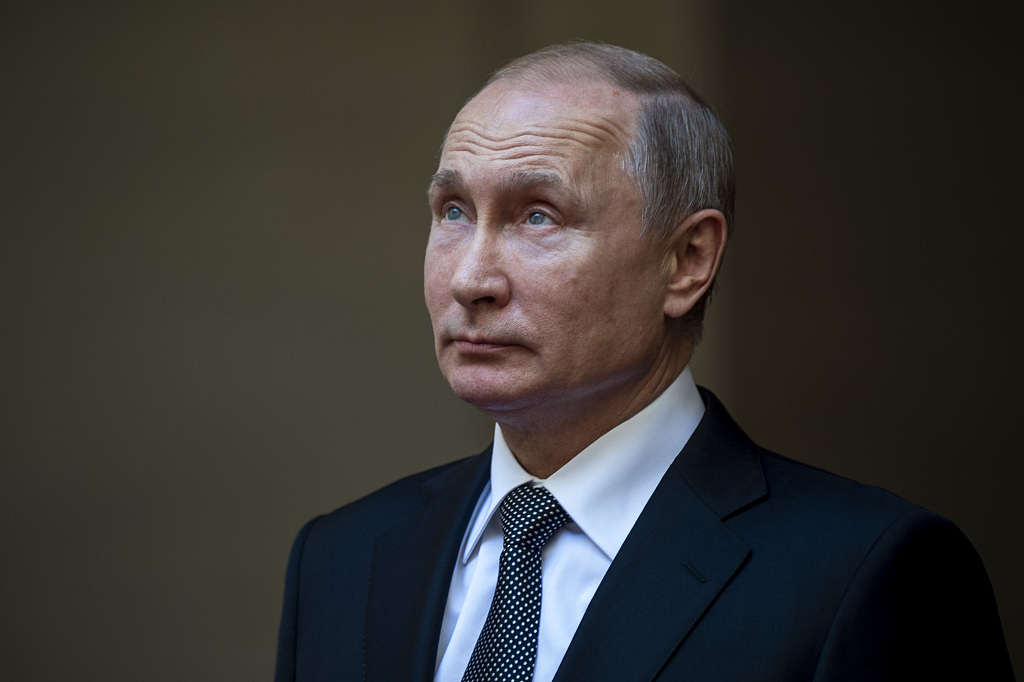
Russian President Vladimir Putin meets Italian Prime Minister Giuseppe Conte (not pictured) for their meeting at Palazzo Chigi in Rome, Italy, July 4, 2019. /VCG Photo
Putin has made it clear that Russia is prepared to let the treaty collapse if the U.S. refused to extend it.
Earlier in July, Russia and U.S. top officials met in Geneva for strategic talks. According to Russian Deputy Foreign Minister Sergey Ryabkov, who led the Russian delegation, the two sides thoroughly discussed the extension of New Start, but limited details were unveiled.
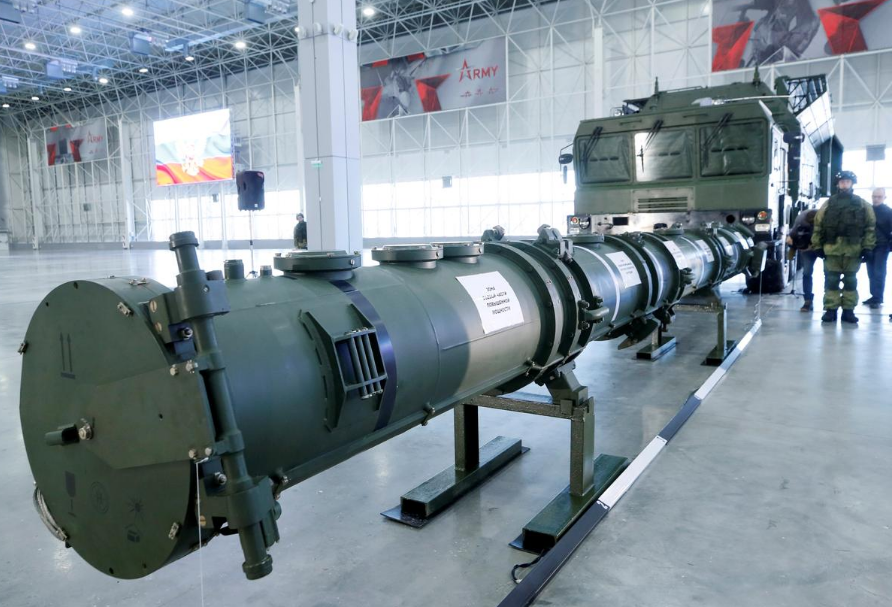
Components of SSC-8/9M729 cruise missile system are on display during a news briefing, organized by Russian defence and foreign ministries, at Patriot Expocentre near Moscow, Russia, January 23, 2019. /Reuters Photo
Has New Start worked?
The pact has played its role in limiting the number of weapons deployed by the U.S. and Russia and strengthening the strategic communication and mutual trust between the two countries.
The New Start Treaty brought the deployed arsenals of the U.S. and Russia to their lowest level since the 1960s.
To date, the two sides have exchanged over 10,000 notifications of movement of delivery systems and have conducted dozens of on-site verification inspections on each other’s territory, according to Arms Control Association, a U.S. nonpartisan membership organization dedicated to promoting public understanding of and support for effective arms control and nuclear nonproliferation policies.
As a result, the U.S. has a significantly clearer picture of Russian strategic capabilities than it could attain by national intelligence means alone. There have been no credible allegations of Russian violations of the agreement and, despite some questionable Russian concerns about verifying the conversion of U.S. strategic nuclear systems to conventional roles, the U.S. also continues to fully implement the treaty, said the organization in a report.
What if New Start also died?
The demise of the only U.S.-Russia arms control pact limiting deployed nuclear weapons would make it harder for each to gauge the other's intentions, giving both incentives to expand their arsenals, according to a study released in March.
The study, produced by the CNA Corp non-profit research group, is the most comprehensive public examination to date of the consequences of New START’s demise.
"Neither country would have the same degree of confidence in its ability to assess the other's precise warhead levels," CNA's Vince Manzo wrote in the study. Worst-case planning is also more likely as a result.
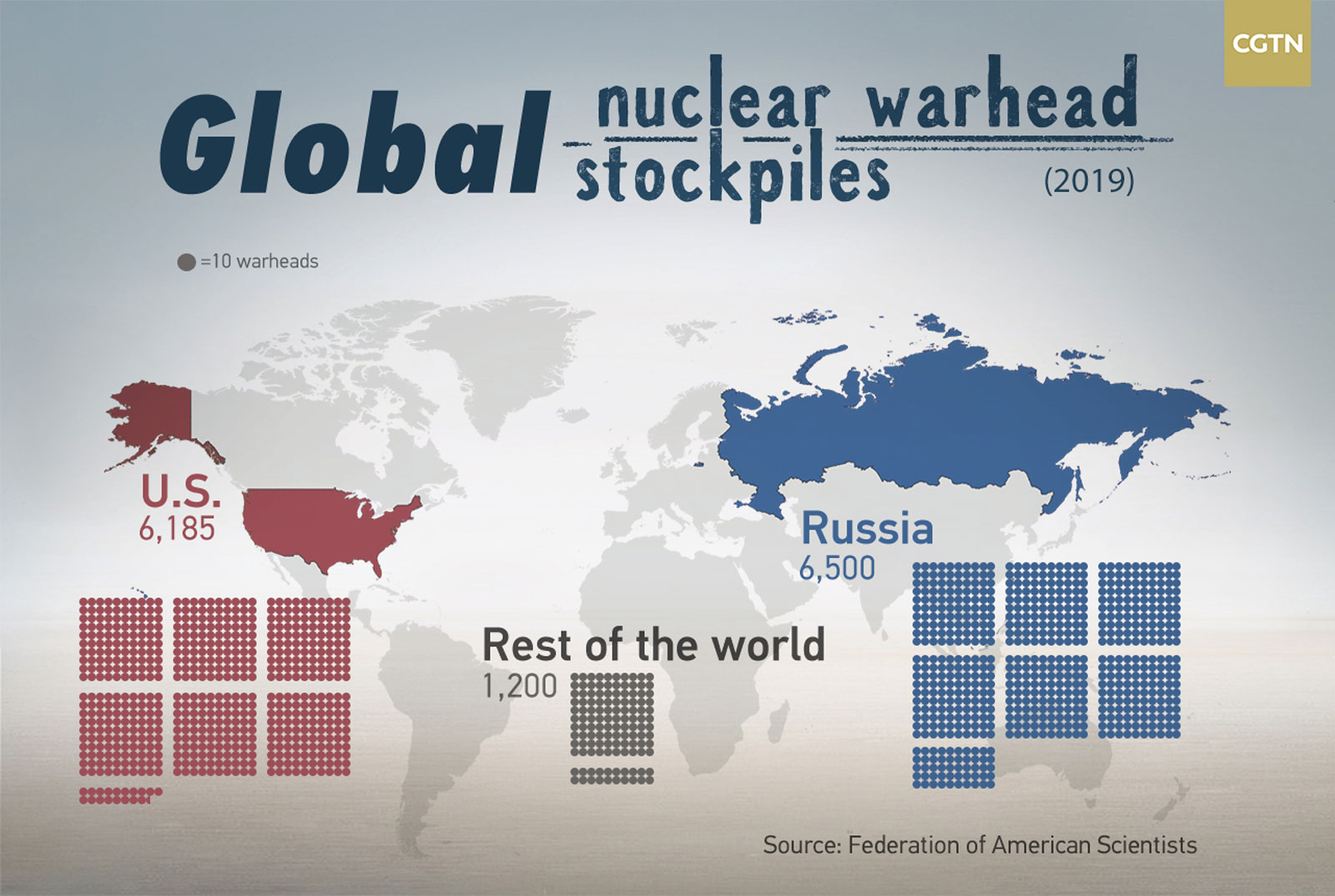
"Increased opacity between U.S. and Russian strategic nuclear forces would unfold within the broader context of growing mistrust and diverging perceptions about strategy, intentions, and perceptions," he added.
Another casualty of the treaty's expiration could be global nonproliferation, making non-nuclear states doubt the U.S. and Russia will keep working toward nuclear disarmament under the Nuclear Nonproliferation Treaty, the study said.
The study recommends steps for the U.S. and Russia to mitigate the risks from the treaty's expiration, including voluntarily sticking to its limits and continuing to exchange data.
China: No conditions for trilateral arms talks
There are voices calling for China's participation in negotiations on the "next generation" arms control deal. Chinese Foreign Ministry said in mid-July that "right now we do not see any conditions or basis for China to join the negotiation between the U.S. and Russia."
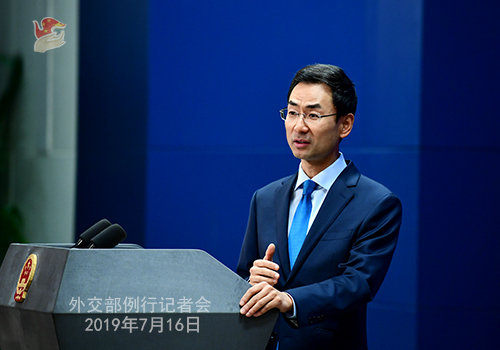
Chinese Foreign Ministry spokesman Geng Shuang speaks at a regular news conference, July 16, 2019. /Photo via Chinese Foreign Ministry
"We made clear China's position on many occasions on whether we will participate in similar negotiations. Right now we do not see any conditions or basis for China to join the negotiation between the U.S. and Russia. Russia also made public statements on this. It totally understands China's position on the so-called China-U.S.-Russia trilateral disarmament negotiation," said spokesman Geng Shuang.
The U.S and Russia own the biggest nuclear arsenals in the world. They have the obligation to follow the international consensus and UN documents including resolutions of the General Assembly, earnestly fulfill their special and primary responsibilities in nuclear disarmament, and continue to drastically reduce their nuclear weapons in a verifiable, irreversible and legally-binding manner, said Geng.
Spokesperson Hua Chunying also called the proposal to include China in talks between the U.S. and Russia as a disguised form of "duty shifting."
"China champions a comprehensive ban on and thorough destruction of nuclear weapons, but nuclear disarmament should adhere to the internationally recognized principle of 'undiminished security for all' concerning arms control," she said.
The U.S., as the largest nuclear state in the world, is burdened with special and primary responsibilities in nuclear disarmament, Hua added.

Copyright © 2018 CGTN. Beijing ICP prepared NO.16065310-3
Copyright © 2018 CGTN. Beijing ICP prepared NO.16065310-3